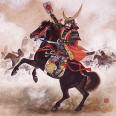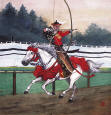 |
|
 |
|
|
|
Beliefs of the Samurai In medieval times, the European knight held to the codes of chivalry. In Japan the samurai code of conduct was called bushido, literally translated as Military-Knight-Ways (Bu-shi-do). In Japan as in Europe this knightly code was taught as a virtue to all ages and classes, but for the samurai it was a way of life. Much like chivalry, bushido has no one definitive written code, but was a compilation of the many doctrines of the samurai families passed down through generations. Even today many of those testaments of the samurai way of life have never been read outside of the family and we rely mostly on one or two translations, contemporary works, or oral traditions. Bushido was heavily influenced by many of the religious beliefs of Japan. The three most influential beliefs were Confucianism, Buddhism, and Shintō. Anyone who has ever seen a film about samurai will have noticed a strict hierarchy in relationships. Confucius taught the samurai his ethical doctrine in "moral relationships between master and servant, father and son, husband and wife, older and younger brother, and between friend and friend" (Nitobe, 1969, pp 15-16). Though imported from China in the third century AD, Japan readily adopted Confucian ideas into its culture. It was this doctrine that gave the samurai a strong sense of duty (giri) and loyalty to the master he was to obey and the vassals he was responsible to protect. During times of peace, though, this feeling of giri could turn to gi-ri or right reason. This could then be corrupted into any action or inaction that suited the samurai at any given situation. Buddhism may come closest to giving samurai the characteristics that most westerners attribute to him. Also adopted from China, though in the sixth century AD, Buddhism taught the samurai to become friends with and accept the inevitable with calm stoicism, thereby losing his fear of it. The inevitable of course being death, whether on the battle field or in his bed. There were many different sects of Buddhism that a samurai could follow, but most notable to the westerner would be Zen Buddhism. Zen Buddhism taught the samurai to search for enlightenment from within and to become detached from the world. This search included perfection in the samurai's martial skills as well as tea ceremonies or rock gardens. This gave the samurai that ethereal quality so captivating to the rest of his country, and the world. Though many Buddhist teachings were practiced by samurai, those who devoted their life to it were usually considered warrior monks.
The word Shintō was given to the indigenous beliefs of Japan in the 19th century that "centered around the worship of a huge number of kami (deities)" (Turnbull, Warriors of Medieval Japan, 2005, pg 55) that could be found in shrines throughout Japan. This belief found expression in the worship of ancestors whose path after death led to deification. This also strengthened the sense of loyalty and giri to their leaders, the Shoguns, and the emperor who was considered a direct descendant of the sun goddess who first ruled Japan. Shintō also stressed purification and avoidance of pollution. Pollution could be found on the battlefield from the corpses of the fallen samurai. The survivors would then have to purify themselves, though usually through Buddhist rituals, and then perform Shintō rites of passage for the dead. All these beliefs gave the samurai the backbone for daily life. Duty, honor, loyalty, enlightenment, and the constant aim of perfection are a few of the traits most people think of when they consider the samurai. |
|
Web site designed and researched by Travis Moorhouse Last updated Monday, December 04, 2006 |